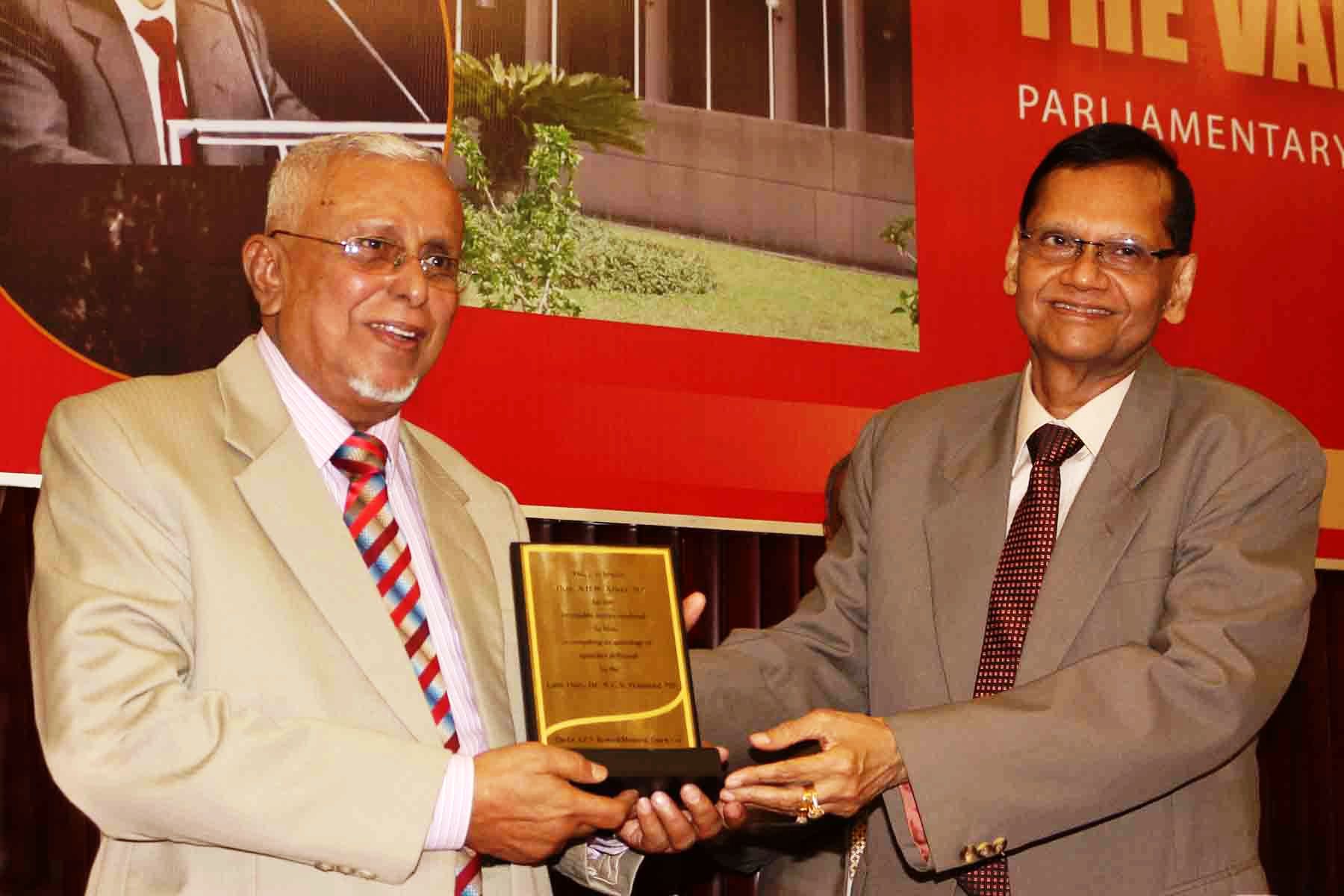
The Book 'The Valley of Gems' containing a collection of Parliamentary speeches of the late Dr. A. C. S. Hameed, veteran Parliamentarian and the first Foreign Minister of Sri Lanka, was ceremonially launched at a ceremony held at the BMICH on Saturday, February 1 at 3.30 p.m.
Prof. G.L. Peiris, Minister of External Affairs, delivered the keynote address at the ceremony. Speaking at the ceremony, Prof. Peiris noted that it was a privilege to speak on the occasion to commemorate the life and ideas of A.C.S. Hameed who had been the longest serving Foreign Minister of Sri Lanka and had a long public life. The Minister stated that he had great affection and profound respect for the late A.C.S. Hameed and recollected his early interaction with Mr. Hameed, then Minister of Higher Education and he (Prof. Peiris) was Vice Chancellor, where they had worked closely together at a turbulent period in Sri Lanka’s history and under trying circumstances. The Minister then recalled that when he entered politics in 1994, Mr. Hameed was then a distinguished member of the opposition front bench and he being a new politician, would meet at least once a month with Mr. Hameed to discuss issues and he found the late A.C.S. Hameed to be a reservoir of knowledge, on practical affairs straddling a wide range of matters.
In those conversations, and the ensuing relationship that developed, Prof. Peiris noted that Mr. Hameed’s many attributes stood out. The Minister noted that Mr. Hameed was a gentile politician, courteous to a fault, concerned about the sensitivities and susceptibilities of others; and an inspiring “exemplar of a culture of politics”, where good manners, sensitivity, politeness and courtesy, were not antithetical to politics. Hameed was able to combine all of them and he had strong views and was a vigorous speaker, stated the Minister.
In echoing comments made by the Chair, the Minister underscored that the late A.C.S. Hameed above all stood for national unity and sought to break down the barriers, which divided society and he noted that Mr. Hameed “was a singular unifying force of great persuasive power.” The Minister drew attention to the fact that at that time, there was not a sharp focus on ethnic political parties and that it was possible for members of minority communities, such as the Muslims for example, to reach the highest echelons of public office, through the ranks of the mainstream political parties, and noted instances where Muslims could do so in the United National Party and the Sri Lanka Freedom Party, and there was no perceived need to carve out a separate overtly Muslim political party. He highlighted that the late Hameed was a clear example of this, having been in politics for over 40 years, serving the people from Akurana, Harispattuwa, who were 78% Sinhalese and had elected him. The Minister noted other present day examples of leading politicians from the Muslim community, who drew support from multi-ethnic communities. Prof. Peiris noted that the memory and life of A.C.S. Hameed clearly eschewed communal politics.
In remarking how the late Minister may have faced some of the challenges that Sri Lanka was being confronted with, he noted that A.C.S. Hameed was a “a Sri Lankan and nationalist” and said that one could drew parallels from some of the values and experiences of Hameed in addressing some challenges that Sri Lanka was facing. Prof. Peiris noted that Hameed would have felt that any proper appraisal of the Sri Lankan situation should be dealt with justice and fairness; where credit should be acknowledged where it was due and criticism where it was warranted, because it was the principled thing to do. Similarly the Minister highlighted that despite narrow political expediency, the government was spending a large amount of resources to rebuild areas of the North, because it was the right thing to do. The Minister presented an overview of the series of developments and efforts taken by the Government such as free elections after a quarter of a century for the Northern Province Council, former combatants being reintegrated into society, with vocational training; internally displaced persons being able to return to their homes and being reunited with their families; and noted that the late Hameed would have been the first to state that these were significant achievements. These were the values Hameed had stood for. Similarly when presenting allegations against a sovereign country, Prof. Peiris noted that there must be ethics and fairness, which should be held up as basic standards. The Minister highlighted that these were values that A.C.S Hameed strongly believed in and he remarked on the dangers of polarisation and division, when these values were not used and there was a desire to believe the worst without evidence.
The Minister appreciated that Hameed insisted that consistency and uniformity of standards should be applied in international relations, across the board to all universally and not selectively to some countries. He noted that the late Minister would be deeply troubled and vehemently opposed and against efforts by some countries to bring above politicisation of some UN bodies and international relations. Prof. Peiris closed in underscoring that the best way to honour the memory of the late A.C.S. Hameed, would be to try to keep alive the values that he believed in and try to the best of one’s ability to apply those values to the delicate and complex situations; and the challenges and circumstances that Sri Lanka faces today.
The ceremony was chaired by President's Counsel M. Faisz Musthapha. Mr. AHM Azwer, MP, Member of Parliamentary Council and Monitoring MP of the Ministry of Mass Media and Information, who edited the book and Mr. Karu Jayasuriya MP also spoke at the ceremony.




